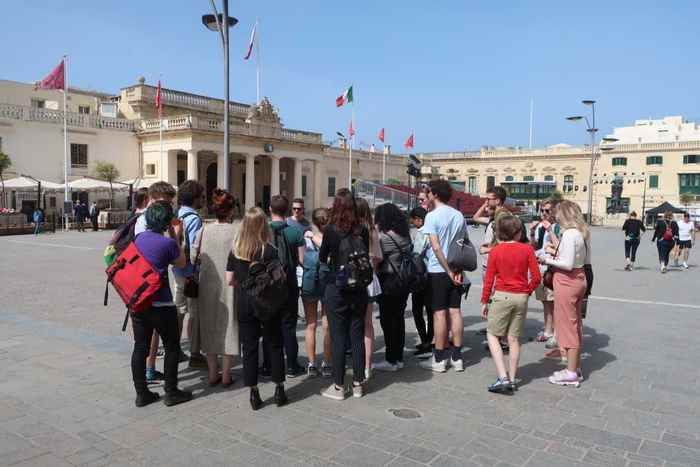Study programme
Develop your academic skills
You will further develop your writing, presentation and research skills, and you will train your organisational skills in the preparation and execution of a study trip to a European Capital of Culture. As part of an international classroom, you will be trained in intercultural and interlingual skills. With these skills, and the knowledge and approach you learn during the programme, you will build a unique expertise in European culture and history that is highly relevant to many parts of Europe’s work environment, whether in the field of culture, politics, media or business.

Our programme explores contemporary intersections between culture and polity, media and identity, and race and state. Given the recent resurgence of nationalism worldwide and the increasing popularity of radical right- and left-wing parties, it is vitally important to understand the tensions between the global and the local that find expression in issues such as nationalism, populism, identity politics, and social media.Dr. Krisztina Lajosi-Moore
Programme structure
In the first two blocks of semester 1 students take three mandatory courses of the MA programme, as well as two electives. The mandatory skills seminar runs from early October to the end of April, and results in a study trip to one of the European Cultural Capitals. In the second semester, students take two more electives and write their thesis.
-
Imagining the Nation: Cultures of NationalismPeriod 16
-
Imagining Europe: Ideologies and PowerPeriod 26
-
Skills Seminar: European Capitals of CulturePeriod 36
-
Restricted-choice electives: Identity and IntegrationPeriod 1Period 2Period 4Period 512
Choose two of the following courses: - Intimate Politics: Culture and Subjectivity in Soviet and post-Soviet Russia - Life Writing and Migration in Europe - East-West Perceptions in Post-Communist Europe - Encountering Diversity - Europe and its Discontents: A political History of Anti-liberalism - Religion, Violence, Conflict Resolution - Memory & Conflict in Eastern and South-Eastern Europe
-
Free-choice electivesPeriod 1Period 2Period 4Period 5Period 612
-
Master's Thesis European StudiesPeriod 4Period 5Period 618
Check the schedule
Wondering what your weekly schedule will look like as a master's student Identity and Integration? Download the illustrative timetable and get an impression of the contact hours, balance between weekdays and your spare time.

Our students particularly appreciate the study trip to one of the European Cultural Capitals like Matera, Rijeka and Novi Sad. This provides the unique opportunity to meet policy makers, artists and city administrators, and to study how culture in European cities intersects with issues of identity, social cohesion, sustainability and the economy.Dr Marleen Rensen
-
Internship
We enable students to do an internship during the MA programme. They can do an internship as part of their programme for max. 6 ECT if the internship comprises an academic component which fits within the framework of the programme. Students can also choose to do a non-academic internship as additional to your programme, which will not be credited. In both cases, the student is responsible for organizing the internship and should do so in consultation with the programme coordinator.
-
Excursion
In the second semester of the academic year, the students will make a trip to one of Europe’s cultural capitals. In preparation they will organize a symposium with experts from outside the academic world to discuss the policies and practices of EU’s cultural capitals programme. In recent years, we have visited among others the cities of Aarhus, San Sebastián and Valletta.

Valetta Study Trip (2018) -
Tutoring
All students will be appointed a tutor who will support them in academic matters and help them fulfill their potential. The tutor will plan plenary and individual meetings to discuss study experiences, progress, thesis ideas or career plans. Throughout the year, students can also contact their tutor for questions regarding the curricular aspects of the Master’s program.
-
How does this Master’s programme differ from European Studies programmes at other universities?
European studies at the UvA stands out for two reasons. First of all, this Master takes a multidisciplinary approach to studying Europe. In comparison to many other programmes in European studies which mainly focus on EU-politics, we try to render justice to Europe’s complexity – its multi-layered governance, its cultural diversity etc. – by combining perspectives from politics, economics, law, history, culture, anthropology and geography. Secondly, as European studies at the UvA is embedded in the humanities, we explore how history and culture in particular contribute to the understanding of Europe and its (dis)contents.
-
Can I take language courses?
Yes, it is possible to take language courses offered by the language departments of the UvA. However, you will not get academic credits for these courses.
-
I hesitate between two tracks (e.g. East European Studies and Identity & Integration): can I do a mixture of both?
You need to register for one of the tracks, which both have their own core programmes. It is nevertheless possible to study at the cross-roads of two tracks, because many electives are open for students from all three Master tracks. This means that you can practically tailor your programme to your own interests.
-
Can I do this Master’s part time and take two years to accomplish the programme?
The programme is designed as a one-year programme and is not meant for part time studying. Nevertheless, it is possible to extend the programme over a two-year period. You can best contact the track coordinator in order to discuss and organize your study schedule.